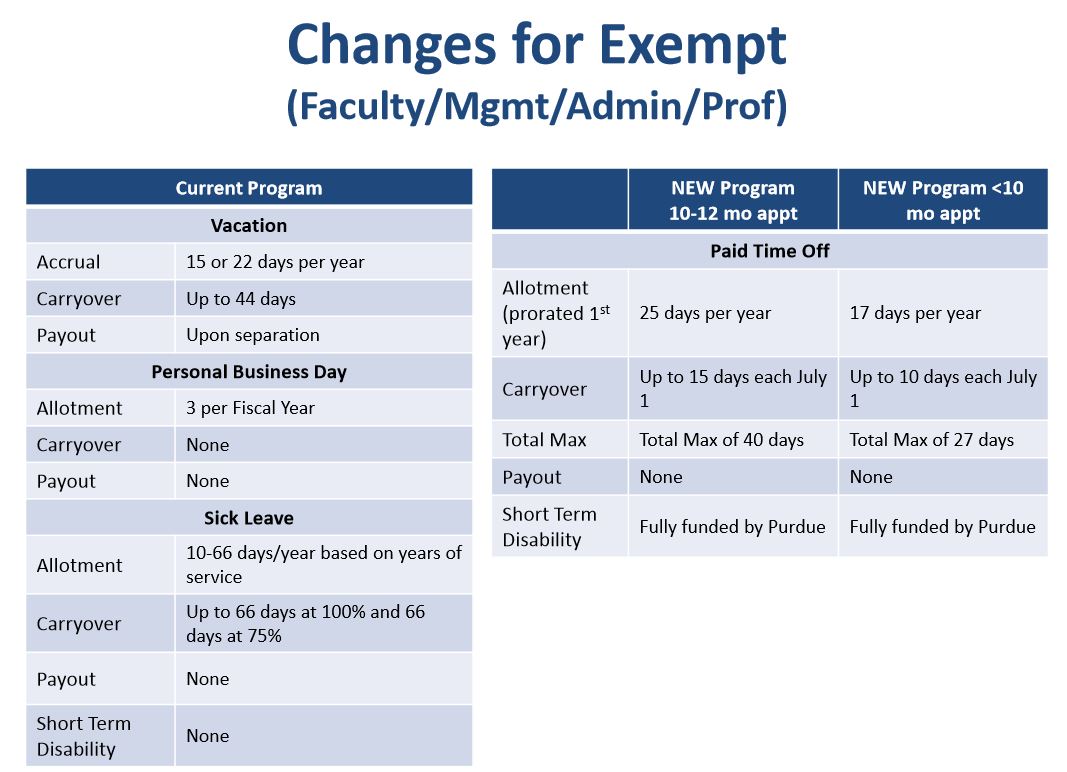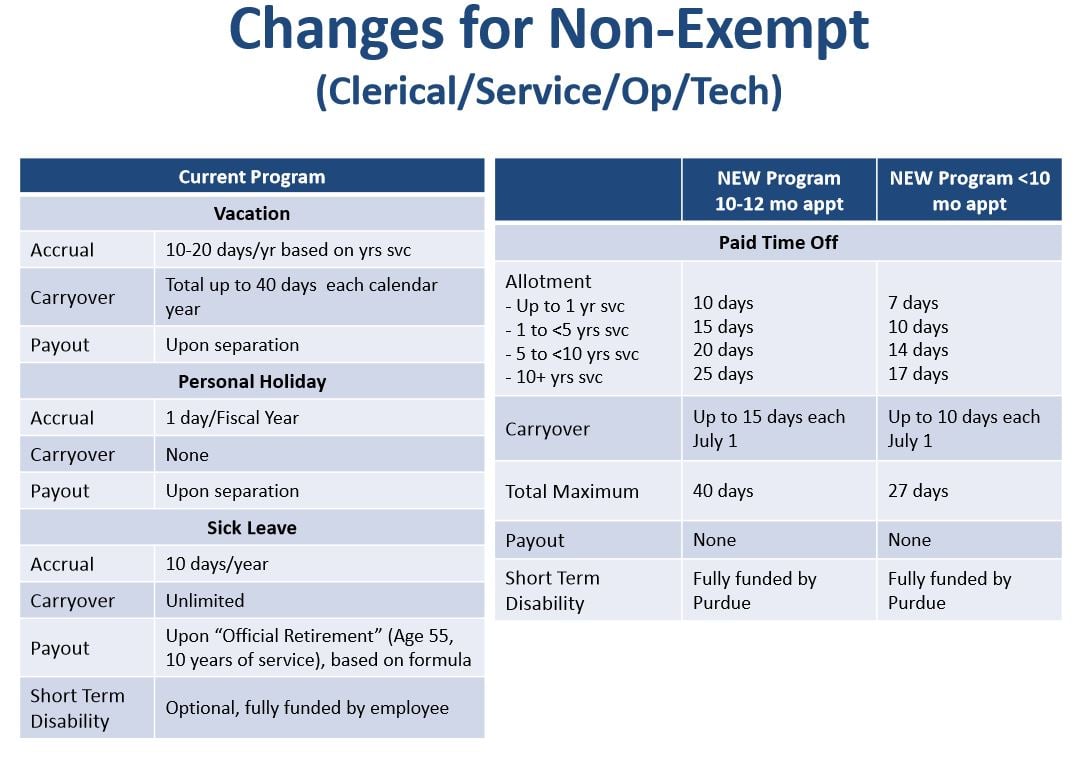You have /5 articles left.
Sign up for a free account or log in.

Open forum at Purdue
Purdue University announced last week that it was it was replacing a "complicated" and outdated system for calculating how many paid days off employees would receive each year. But when employees actually counted up the days they could receive off in the old and new systems, many were dismayed to find that the "simplified" one was substantially less generous than the current one.
The university announced changes for one plan that covers clerical, custodial and service employees and another that covers faculty members and administrators. The university said it was responding to employee concerns about how complicated the system is. But employees feel they are losing ground in most of the changes. But attention has been focused on the plan for clerical and service employees, because their salaries are lower than others' at Purdue.
While faculty have been speaking out against the changes proposed for them, most have focused on the staff changes. And staff members -- who lack tenure -- have welcomed the focus (with several staff members who reached out to Inside Higher Ed referring questions to tenured professors, saying that they needed these people to speak on their behalf).
On Friday, about 750 Purdue employees -- faculty and staff alike -- attended an open forum that focused on the impact on staff members. Longtime Purdue employees said this kind of turnout and public anger of employees was rare if not unheard of at the university.
During a lengthy meeting, not a single employee (aside from the human resources administrators explaining the changes) said it would improve his or her situation. Many said their personal circumstances would be hurt, and that Purdue was destroying a strong bond that has historically existed between employees of all types at the university. Among the tweets from the meeting: "Many people were hired with a specific expectation and that changed unilaterally," "People in audience pouring their hearts out to give their perspectives" and in a tweet to administrators: "Audience: not to be rude, but you’re doing a sales job but no one here is buying it."
One example cited by many employees is that the changes would remove provisions that allow staff members to carry over unused sick days (of which they receive 10 a year) and to be paid for unused days upon retirement. Employees say that in many Purdue departments and laboratories, a single staff member responsible for key clerical or cleaning duties tends to try very hard not to call in sick, so as not to disrupt work. And because they aren't paid a lot (or able to save a lot), they view the eventual payout as part of retirement planning. Staff members who have complained about this change report being told that they should be taking sick days regularly -- and should not expect the days to help them later.
Overall, staff members at Purdue today have between 21 and 31 paid days off a year, counting vacation and sick leave and a single personal day off, depending on years of service. The days are specified, so someone starting off would have 10 vacation days, 1 personal day and 10 sick days. Under the new system, someone starting off would have just 10 days off (for all purposes) and that would rise over years of service to 25 days. (See slides at end of article, which come from a PowerPoint Purdue officials distributed.)
At the forum (and in e-mail surveys), many staff members said they would lose about six days a year of paid time off -- and then lose more by lack of payout upon retirement.
For faculty members, the drop in total days a year would be from the current system of between 28 and 91 days (depending on years of service, with the higher totals available to longtime faculty) to 25 days a year. Carryover days from one year to the next would be reduced.
Both faculty and staff would benefit from a new short-term disability program from the university. But at Friday's forum, people said that didn't offset the anger over the changes to leave policies.
Patricia Hart, professor of Spanish and chair of the University Senate, said in an interview after the meeting said that while many faculty are frustrated about the changes, the top concern is staff members. "The people being most hurt are those at the bottom of the pile," she said. Professors, who rely on staff members every day, have decided they need to take a stand for staff even before they speak out about concerns over the faculty plan. "We have lots of employees earning minimum wage or close," Hart said. And they won't have the same options as more highly paid faculty member to deal with these changes by using their salaries to pay for various things, she said.
In widely praised remarks at the start of the open forum, Hart said that frugal budgets at Purdue are hurting people who don't have wiggle room in their budgets.
"Austerity management has meant that, through attrition, one person may be doing the job of two or three. Many live with the constant stress of worrying that they might be downsized," she said. "Did you know that up to 14 percent of the clerical and service staff who work full time have second jobs? ...A number of clerical and service staff live below the 2015 federal poverty guidelines. If there are low raises and shrinking benefits, it becomes harder and harder to sustain the positive work environment that we need for preeminence."
Hart noted that Purdue has been operating on a frugal budget of late, with President Mitch Daniels announcing tuition freezes and telling various audiences that the university could preserve quality and help the families paying Purdue tuition in this way. Hart said she applauded the administration's concern for the families of Purdue students. "But Purdue faculty and staff also have families," she said.
Purdue's news office referred questions to Trenten D. Klingerman, interim vice president for human resources at Purdue (who many employees said had been gracious in listening to criticism, and who they don't think is responsible for "austerity" measures being imposed campuswide). Via e-mail Klingerman said that he did not view the changes as motivated by a desire to save money. He said that it would cost $1.3 million annually to add the short-term disability payments. Savings from the other changes would be over the long term.
Purdue hasn't backed away from any part of the plan, he said, but was taking the complaints seriously. "It is clear, both from the high rate of attendance and the passion expressed, that there is significant concern regarding the proposed changes," said Klingerman. "As I told the faculty and staff at the forum, we are taking their concerns seriously as we continue study the plan design."






